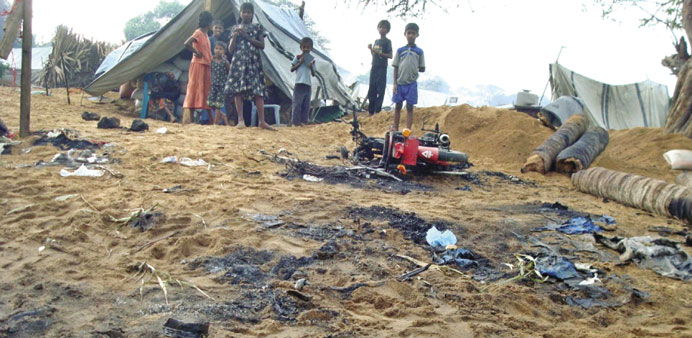Tamil civilians near remnants of a shell fired by the Sri Lankan army inside rebel-held territory in Mullaittivu in May 2009.
The provincial government in Sri Lanka’s main Tamil region said yesterday it would compile its own death toll from the country’s ethnic war, saying an ongoing census would play down the number of casualties.
Tamil officials said the census ordered by President Mahinda Rajapakse last month would give a distorted picture because of its “flawed” terms of reference, arguing that a more credible alternative was needed.
“The council will work out the logistics of taking a count,” Dharmalingam Sithadthan, a senior member of the Northern Provincial Council, told AFP from the regional capital Jaffna. “This is something we have to do because we don’t accept the government census.”
The United Nations has estimated that at least 100,000 people were killed in Sri Lanka’s 37-year separatist war with about 40,000 civilians killed in the final months of fighting in 2009. The Rajapakse government kicked off its own census late November after disputes over the scale of the killings in the final phases of the war dominated a Commonwealth summit in Colombo earlier in the month.
Sri Lanka has repeatedly rejected allegations that its troops killed civilians while battling the separatist Liberation Tigers of Tamil Eelam, who were also accused of using civilians as a human shield.
While launching the government census in November, the head of the public administration ministry, P.B Abeykoon, said they had “nothing to hide”.
But Suresh Premachandran, a member of the Tamil National Alliance party who represents Jaffna in the national parliament, said the census had been designed to minimise the death toll.
Compilers of the census would only be able to ask survivors whether they had lost spouses, sons or daughters and would not be allowed to ask survivors about the fate of their parents, said Premachandran.
The census would also lack any input about casualties from survivors who have sought refuge.
“We strongly believe this is an attempt to give lower figures for war fatalities,” Premachandran said.
“For planning purposes of the council, we want the actual numbers, not watered down figures,” he added.
The provincial council says it needs comprehensive casualty figures to provide social services to widows, orphans and other victims of what was one of Asia’s longest and bloodiest conflicts in the post-colonial era.
Rajapakse, who is a member of the majority Sinhalese community, has rejected proposals for international investigators to conduct their own separate inquiry.

